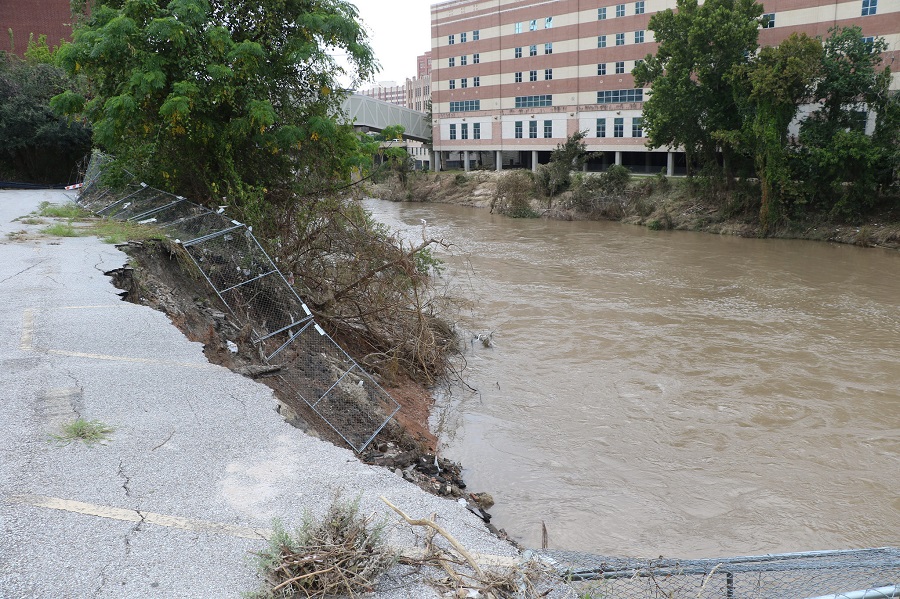
- 7 Superfund Sites in Houston, 13 Statewide Were Flooded by Harvey, Experienced ‘Possible Damage’Â [AP]
- Without Disputing Claims, EPA Calls AP Report on Superfund Sites ‘Misleading’ [Politico]
- After Explosions, Harris County Fire Marshals Burn Down Last 6 of Arkema’s Chemical Containers in Crosby [Houston Chronicle]
- Texas Lets Companies Keep Chemical Inventories Secret, Even in Emergencies [Texas Observer]
- Thousands of Houston Rental Homes Owned by Wall Street Could Be Affected by Harvey Flooding [HBJ ($)]
- Storm Flooding Destroyed Hundreds of Thousands of Cars in Houston Area [Washington Post]
- Upwards of 12,000 Houston ISD Students Will Likely Be Temporarily Displaced from Their Storm-Damaged Schools [Houston Chronicle]
- Airbnb Asking Hosts To Offer Free Stays to Hurricane Evacuees Through Sept. 25 [New York Times]
- Where Are Houston’s Displaced Going To Live Now? [Houston Press]
- Some Houston Residents Still in Crisis While Others Return to Normal [Houston Chronicle]
- Historic Amount of Detritus Expected from Storm Damage [Houston Chronicle]
- Bryan Caswell’s Oxbow 7 To Debut in Mid-September [Eater Houston]
- Humble Homeowner Finds 9-Ft. Alligator in Dining Room After Floods [abc13]
- Receding Floodwaters Reveal Extent of Houston Area’s Post-Harvey Destruction [HuffPost]
- 12 Sewage Spills Already Reported After Harvey; Environment Texas Estimates Sewage Overflows Could Eventually Total in the Millions of Gallons [Houston Public Media]
- How Professional Drone Pilots Are Helping Houston To Recover [Wired]
- Booming Houston Built Over Land Meant for Flood Projects [AP]
- The Political Roots of Houston’s Flooding [The Nation]
- Zoning Would Not Have Stopped Harvey [Phillip W. Magness]
- How Houston’s Population Boom Made Harvey’s Damage Much Worse [NBC News]
- Houston Still a Model City for Growth, Says Center for Opportunity Urbanism [New York Times]
- Town After Town Under Water in the 100 Miles from Houston to Beaumont [New York Times]
Photo of Buffalo Bayou Downtown (yesterday): Christof Spieler via Swamplot Flickr Pool
Headlines





Glad to see some links to articles not going with the flow that the flooding is indicative how “bad” Houston is at growth and planning.
If we received only about 16-18 inches of rain in a 24 hour period and experienced the same level of flooding, then articles about Houston development causing floods would be valid.
You can’t use Harvey as a basis to say regulations were bad.
Going back to the Tax Day floods, the level of flooding seen was predictable. People that flooded should have expected to flood in those events. The rainfall amounts and water elevations were predictable by the volumes of modeling data on our streams. Our infrastructure functioned as planned and designed.
Harvey provided rainfall beyond what our infrastructure would be able to handled, but we would never design it to be able to handle it.
Over the next few months/years, Harvey’s rainfall will be studied heavily. Recorded high water marks will be used to calibrate existing models.
A plus side…in a natural disaster, the federal government primary roll is to cut checks. FEMA will disburse money through coordination with local agencies. After the recovery, more checks will be cut to perform buyouts and build new flood protection measures. Continuing existing projects that have been underway for over 20 years. The Houston region has been retroactively building flood protection to office urban development from it’s founding through the late 80s that did not incorporate storm water mitigation measures. More funding means planned and future projects will continue.
These projects will not prevent another Harvey, but will go a long way to help in events like the Tax Day floods and lesser more frequent storms.
So, now we have the right wing version of climate change deniers. Development causing flooding deniers. It is all the same armchair expert BS arguments like that Magness guy makes. Houston has more parks per capita than other cites. Therefore, development did not cause flooding. The Brazos river goes through some native prairies and it flooded. Therefore, development did not cause flooding. Houston has always had big floods even before it was developed. Therefore, development did not cause flooding.
But if you follow the development deniers logic beyond the denial, you can only reach one conclusion: devastating flooding is inevitable in Houston. If this truly is the conclusion, Houston will begin to see an end to its world leading growth as businesses and people decide that 5 months of temps in the 90s, smog and endless traffic are not worth it if they could lose all their wordly possessions and have their business shut down at any time due to a big flood event. But this is where flooding deniers show their intellectual dishonesty. They never address whether better flood control systems and restrictions on building close to waterways and reservoirs could prevent a significant amount of flooding in Houston. If it is possible to build better flood control systems, then there argument is eviscerated because what sort of idiot would build and permit building when devastating flooding was all but a certainty? If building better flood control systems will not make a difference, then Houston has a very bleak future as the city where you can pursue your dreams only to have it all taken away in the next big flood.
My problem with the “zoning prevents flooding” takes is that they get the issue almost exactly wrong. The conclusion most of these writers draw is this: “Houston has a lot of sprawl. Houston doesn’t have zoning. Therefore the lack of zoning must have caused the sprawl.” This is basically the exact opposite of true.
.
While it IS true that Houston famously doesn’t have zoning, it’s NOT true that this is what causes sprawl. We don’t have land-use zoning, but pretty much everything else IS regulated by the city. (And most of the upstream communities outside the city DO have land-use zoning.) And it is exactly this regulation, such as minimum parking requirements, setback requirements, and residential density caps (since lifted), that incentivized the “strip mall and sprawl” development patter that defined the city in the latter part of the 20th century.
.
Arguably the absence of zoning prevented a worse tragedy by allowing for higher residential density within the city limits. Pretty much without exception, cities with restrictive zoning codes have lower residential densities than the market would otherwise provide. All that population now living in 5-story apartments inside the loop might otherwise be living in single family homes in the suburbs, with a much higher amount of impervious cover per resident.
Oldschool: I think you can prevent flooding for events like Harvey the same way you could prevent damage in California even from ‘the big one’. The issue is ‘at what cost’ and does the cost exceed the damage.
.
Even though California has continually increased codes to protect against earth quakes, when the big one comes, there will still be a ton of damage. It wont’ be because those codes are too lax. It’ll be because you can only plan for so much.
.
I’m sure development played a roll in the flooding. If there were no buildings, only empty land, nothing would be damaged and the land would absorb the water better. But it’s not in our nature to not develop. Given the freakish nature of Harvey, I think Houston faired pretty well (I realize there were so great losses of course, but it could have been worse)
@ Old School: Does development cause flooding? Yeah sure, structures and objects displace water from one three-dimensional geometric space to another over time. **That is by design.** Anything worth protecting from flooding is going to induce additional flooding somewhere (ideally somewhere of little consequence, like a designated channel or basin which is encompassed by and incorporated into the development). This is tautological. However, development also is not the only cause of flooding. Flooding even occurs in the wilderness, a result entirely of natural phenomenon which can impact civilization downstream from it. Some forms of development, such as flood control reservoirs, exist in order to lessen the frequency or severity of such events. These assertions are not controversial. Therefore it is insufficient simply to say that the problem is development. Development can help or hinder, so any explanation must be more nuanced than to simply summon the ‘D’-word.
.
Houston has flooded ever since it was founded. You might notice the NY Times headline which reads: “Town After Town Under Water in the 100 Miles from Houston to Beaumont”. Towns flooded all the way west to Smithville and La Grange, and towns upstream from Richmond/Rosenberg have flooded too. These are not areas plagued very by the ‘development’ demon. On that note, its interesting to look at the satellite imagery of Rosenberg. The older part of town flooded badly. Some rural neighborhoods and older acreage communities, spared any development guidelines really to speak of, also got it. Where didn’t it tend to flood in that very same area? Pockets of contemporary low-cost ticky-tacky suburb, that’s where. Development standards are important, are considered, do exist in the Houston area, and have come a very long way in a relatively short span of human history. It shows. Our problems with legacy development are also evident and well understood. None of that evidences anybody of any consequence whatsoever denying a damn thing regarding the ability and propensity of the Houston area to flood severely.
.
That’s where keying on an analogy to climate change denialism fails. Houston isn’t a region that denies that it has a fundamental problem relating to its climate; it is a region that is struggling to incrementally adapt to that, and which already considers it a constantly-morphing threat. It is a bellwether city! What we’re finding is consistent with what should be expected: solutions to its problem are far more politically complex than simply assessing the scope of that problem, although the latter task is also problematic. What is happening in Houston is a lesson in climate human adaptation at a huge scale and that lesson is highly nuanced, politically frustrating (especially with public finance), and which often yields sometimes public discourse which is totally baffling, tangential and inane.
.
This stuff isn’t going to play out as it is portrayed in Discovery Channel docu-dramas of future disaster, where the central government rushes in to build a megaproject cheaply rendered in CGI. It’s going to be goddamned boring for the most part and highly incremental.